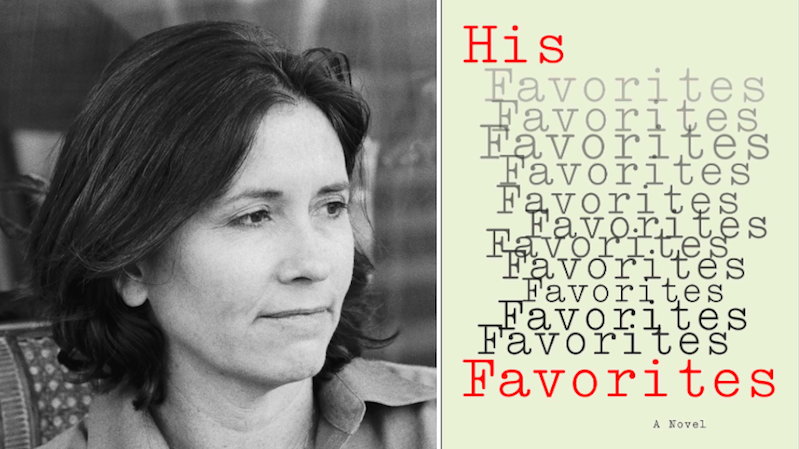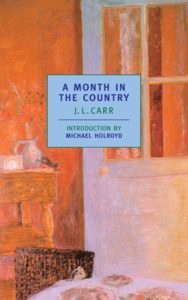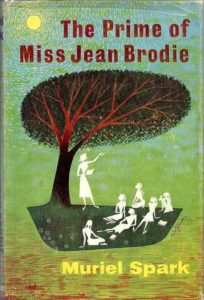
Kate Walbert’s new novel, His Favorites, is published this month. She shared her list of five novels to read over a weekend with Jane Ciabattari.

A Month in the Country, J. L. Carr
This is a novel I reread every few years because it has this enormous resonance—it’s in my favorite genre, or maybe better to call it mode, like a musical mode, when a narrator looks back on how his or her entire life has been permanently colored by a single moment in time, or month in time, I guess. It’s the time Forster in Aspects of the Novel defines as “value” time: the pinnacles that rise up when looking back at life, not the flat landscape of linear time. Tom Birkin, the narrator, recalls a “month in the country” from a now-distant perspective—his arrival in Oxgodby in northern England, a veteran of the Great War and suffering from shell shock he’d “caught at Passchendale,” to restore a wall painting in the local church. But Carr’s story is about nothing less than redemption, love, art, you name it, and all of it suffused with this quiet urgency and gravitas.
Jane Ciabattari: Indeed, the beginning and ending—arriving by train, departing regretfully after finishing the job (“the first breath of autumn was in the air, a prodigal feeling, a feeling of wanting, taking, and keeping before it is too late”)—make for a clear brief structure. What makes this novel feel so expansive? Does that have to do with the fluidity of Carr’s approach to time? His movement back and forth and into the future within a few paragraphs?
Kate Walbert: I wish I could say for sure—it’s one of the reasons I return to the book—to try to figure out (and enjoy again) how the story captures both that vivid presence of now, the moment, and the bittersweet melancholy of memory, call it the Greensleeves effect. I think the expansiveness comes from Carr allowing Birkin to tip his hand in the closing pages, to risk sentimentality and speak directly to the issue of time passing—“we can ask and ask but we can’t have again what once seemed ours forever—the way things looked, that church alone in the fields, a bed on a belfry floor….” I had a teacher who said every great work of literature should be read as a metaphor for the act of writing. I think that holds true here.

The All of It, Jeannette Haien
This was recommended to me years ago—one of the world’s best titles—and is one I almost always insist on others and then bug them to have a follow-up conversation when they’ve finished reading. A true miracle of a book. I also love that it was Haien’s first, published in her sixties. (She wrote only one other, Matters of Chance, before her death.) The story centers on a young widow’s revelation to her priest the extraordinary details explaining her husband’s deathbed confession that the two were not legally married. Enda reveals that she and her “husband” were actually brother and sister, and then goes on to tell over a long evening the story of their brutal childhood. In the opening, we’re with Father Declan the day after the burial of the “husband” as he fishes in an Irish salmon stream and relives the story and his complicated feelings of judgment, empathy and compassion toward Enda. It’s a novel that examines redemption, forgiveness and absolution from every angle.
JC: Chekhov’s “gun on the wall” rule works here; with The All of It, it’s the salmon in the opening lines: “…the river too high and wild from all the rains, and the salmon therefore not moving, just lying on the bottom, not showing themselves…” How do you read the salmon’s journey through this novel, which is layered with questions about morality and love?
KW: Right! Gun on the wall, salmon in the stream … the salmon’s journey is more a stasis given the elements, but Father Declan refuses to give up his aim, which may lead to his eventual understanding of Enda’s decisions. While fishing he recalls every detail, and the look and sound of her telling the story, regretting all over again his eagerness to judge and his recognition of being “mantled in the dogma of purpose”; he’s essentially done up by his feelings toward her. This as he stands casting his line on a miserable Irish day—rain and wind and cold that makes you want to put on an extra sweater—his angler determination set despite the torturing midges, the “ghosting mists like amorphous shifts of sorrow.” It’s both a happy and sad resolution he comes to, full of, well, grace—the knowledge that nothing can “fully dry the angler’s heart of it.” You can guess whether or not he catches the fish….

So Long, See You Tomorrow, William Maxwell
Was there anything Maxwell couldn’t do? A long-time New Yorker fiction editor as well as accomplished novelist, his letters to Eudora Welty, published in a collection some years ago, are a testament to everything lovely and good. He has been one my favorite writers since I came across his work in graduate school, and this short novel as well as They Came Like Swallows are among his best. Its construction is perfect, opening with a short chapter, a straightforward description of a murder, before shifting to the narrator’s story, like Swallows, of how as a young boy the sudden death of his mother from Spanish influenza threw him into a sadness from which he never could escape, even as the rest of his family moved on. Fifty years later, the narrator looks back, but his focus is his friend, Cletus, an isolated boy whose father was implicated in the murder, as he imagines the circumstances that led to the crime. It’s a story that is a little bit a murder mystery and also a meditation on loneliness and guilt. Like Carr, Maxwell’s So Long, See You Tomorrow, seems to perfectly embody Faulkner’s line, “The past is never dead. It’s not even past.”
JC: Did you look to Maxwell for the structure of His Favorites, which begins with the narrator’s involvement in a death of a teenage friend and explores her own abuse at fifteen by her teacher from a perspective years later?
KW: That would have been really wise of me, but no! I don’t tend to plan out my work, or have any sense of where it will take me—the mystery of not knowing is what makes it interesting. With His Favorites, the opening tragedy of the novel, which occurs in the first ten pages of the story, understandably clouds everything that ensues—especially given the very close first person narration. Jo is haunted by her responsibility for her friend’s death, so the revelation and remembering of what then will happen at the Hawthorne School is viewed through the scrim of that guilt.
The Awakening, Kate Chopin
This may be the best known of the books I chose, ironic given its reception. A young woman “not a mother-woman” on a seaside holiday with her husband and children becomes infatuated with a young man who triggers an awakening that continues long after her return to New Orleans, where she eventually moves out of her home and strives for time alone. What is remarkable is the wry wisdom of the omniscient narrator. It is a voice that interrupts and challenges the drama of the story at every turn with sly, knowing commentary: “In short, Mrs. Pontellier was beginning to realize her position in the universe as a human being.” And it earned the novel instant infamy and later recognition as one of the first feminist works of fiction. The ending: Edna casting aside her “pricking garment” to walk naked into the sea, having lost everything for a measure of independence so she would not be possessed “body and soul,” still shocks.
JC: “The voice of the sea speaks to the soul. The touch of the sea is sensuous, enfolding the body in its soft, close embrace.” I first read this book (and Charlotte Perkin Gilman’s “The Yellow Wallpaper”) in graduate school, and it was a revelation. Are there ways in which Chopin’s work showed you a pathway into your own?
KW: I also remember reading The Awakening for a class and learning how, on its publication in 1899, it caused such a controversy and ruined Chopin’s career. Reviewers apparently condemned her for creating a fictional character (the omniscient narrator) that would not pass judgment on another fictional character’s (Edna) revolutionary actions of self-fulfillment. Wow. Writing as a truly revolutionary act. My reading of the novel was in the late Seventies, and things of course were changing for women, but all that time had gone by and the truth is, a lot of the same questions were still being asked. You might say Chopin, through Edna, articulated Friedan’s “problem that has no name,” although of course Edna could not name it, she could only feel it. (And Chopin’s narrator could slyly point to it.) In terms of my own work, I think this book, and “The Yellow Wallpaper,” piqued my curiosity in the stories of my mother’s generation, women whose choices were prescribed. Later, writing them into fiction and imagining their interior lives and unspoken histories led to all the issues Chopin exposed all over again or maybe it’s better to say, felt at times like being in an historical echo chamber.

The Prime of Miss Jean Brodie, Muriel Spark
There’s so much to plumb in books and stories about teachers and their pupils—and Spark’s Miss Brodie and the Brodie set have limitless possibilities. The critic James Wood called Spark’s novels “devoutly starved,” and it’s true that in Miss Brodie we see a woman we never fully apprehend, even as Spark gives us her lifetime as well as the lifetimes of her pupils, effortlessly spinning the dial forward and backward, even within a single paragraph. At the start of the second chapter, we witness poor Mary Macgregor perishing in a hotel fire at the age of twenty-four before, by paragraph’s end, toggling back to Mary at age ten and sitting “blankly among Miss Brodie’s pupils.” Spark gets children in the way of Salinger, how their interior dramas make bearable the blah blah blah of dealing with adults. She can turn a sentence on its ear. Her dialogue is so funny and spot-on—she was a playwright as well.
JC: Miss Brodie encourages daring: “Safety does not come first. Goodness, Truth, and Beauty come first. Follow me.” Master Aikens in His Favorites seems the opposite of Miss Brodie, preying upon your fifteen-year-old narrator in her 1970s boarding school, warning her when she threatens to tell that no one will believe her, destroying self-esteem.
KW: Yes, he is an evil character. Not an easy one to look at, or to write. But it is a truism that teachers have enormous power—they can and often do inspire, yet they can also cripple. One thing I find interesting about Spark’s Miss Brodie is that she is finally dismissed from her position not for her amorous talk and affairs, which seemed at first to be her most dangerous undertaking, but for her fascist political leanings—a great admirer of Mussolini and Hitler. That’s an interesting choice for Spark.
If you buy books linked on our site, Lit Hub may earn a commission from Bookshop.org, whose fees support independent bookstores.

